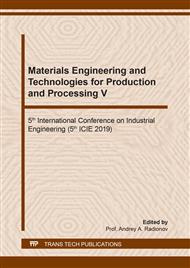[1]
J. Herney-Ramireza, Miguel A. Vicenteb, Luis M. Madeirac, Heterogeneous Photo-Fenton oxidation with pillared clay-based catalysts for wastewater treatment: A review, Applied Catalysis B: Environmental. 98 (2010) 10-26.
DOI: 10.1016/j.apcatb.2010.05.004
Google Scholar
[2]
A.Z.M. Badruddoza, A.S.H. Tay, P.Y. Tan, K. Hidajat, M.S. Uddin, Carboxymethyl-b-cyclodextrin conjugated magnetic nanoparticles as nano-adsorbents for removal of copper ions: synthesis and adsorption studies, J. Hazard. Mater. 185 (2011) 1177-1186.
DOI: 10.1016/j.jhazmat.2010.10.029
Google Scholar
[3]
A.Z.M. Badruddoza, Z.B.Z. Shawon, W.J.D. Tay, K. Hidajat, M.S. Uddin, Fe3O4/cyclodextrin polymer nanocomposites for selective heavy metals removal from industrial wastewater, Carbohydr. Polym, 91 (2013) 322-332.
DOI: 10.1016/j.carbpol.2012.08.030
Google Scholar
[4]
A.Z.M. Badruddoza, Z.B.Z. Shawon, D.W.J. Tay, K. Hidajat, M.S. Uddin, Endocrine disrupters and toxic metal ions removal by carboxymethyl-b-cyclodextrin polymer grafted onto magnetic nanoadsorbents, J. Chem. Eng. 27 (1) (2013) 69-73.
DOI: 10.3329/jce.v27i1.15862
Google Scholar
[5]
S.S. Banerjee, D.-H. Chen, Fast removal of copper ions by gum arabic modified magnetic nano-adsorbent, J. Hazard. Mater. 147 (2007) 792-799.
DOI: 10.1016/j.jhazmat.2007.01.079
Google Scholar
[6]
A. Bee, D. Talbot, S. Abramson, V. Dupuis, Magnetic alginate beads for Pb(II) ions removal from wastewater, J. Colloid Interface Sci. 362 (2011) 486-492.
DOI: 10.1016/j.jcis.2011.06.036
Google Scholar
[7]
A. Bibak, Cobalt, copper, and manganese adsorption by aluminium and iron oxides and humic acid, Commun. Soil Sci. Plant Anal. 25 (1994) 3229-3239.
DOI: 10.1080/00103629409369261
Google Scholar
[8]
L.M. Blaney, S. Cinar, A.K. Sengupta, Hybrid anion exchanger for trace phosphate removal from water and wastewater, Water Res. 41 (2007) 1603-1613.
DOI: 10.1016/j.watres.2007.01.008
Google Scholar
[9]
M. Carotenuto, G. Lofrano, A. Siciliano, F. Aliberti, M. Guida, TiO2 photocatalytic degradation of caffeine and ecotoxicological assessment of oxidation by-products, Glob. Nest J. 16 (3) (2014) 265-275.
Google Scholar
[10]
Y.-C. Chang, D.-H. Chen, Preparation and adsorption properties of monodisperse chitosan-bound Fe3O4 magnetic nanoparticles for removal of Cu (II) Ions, J. Colloid Interface Sci. 283 (2005) 446 – 451.
DOI: 10.1016/j.jcis.2004.09.010
Google Scholar
[11]
J.H. Jang, H.Y. Choi, G.B. Han, Production of dry oxidant through catalytic H2O2 decomposition over Mn-based catalysts for NO oxidation, Clean Technology. 21 (2015) 130-139.
DOI: 10.7464/ksct.2015.21.2.130
Google Scholar
[12]
S.L. Sharifi, M.H. Hosseini, A. Mirzaei, A.S. Oskuloo, Catalytic Decomposition of Hydrogen Peroxide in the Presence of Synthesized Iron-Manganese oxide Nanocomposites via Different Methods, Int. J. Nanotechnol. 11 (4) (2015) 233-240.
Google Scholar
[13]
K. Nakamura, Y. Oaki, H. Imai, Monolayered Nanodots of Transition Metal Oxides, J. Am. Chem. Soc. 135 (11) (2013) 4501-4508.
DOI: 10.1021/ja400443a
Google Scholar
[14]
Q.L. Zhu, Q. Xu, Immobilization of ultrafine metal nanoparticles to high-surface-area materials and their catalytic applications: Review, Chem. 1 (2016) 220-245.
DOI: 10.1016/j.chempr.2016.07.005
Google Scholar
[15]
S.Chr. Turmanova, I.V. Dimitrov, E.D. Ivanova, K.G. Vassilev, Complexes of Hybrid Copolymers with Heavy Metals: Preparation, Properties and Application as Catalysts for Oxidation, Polym. Bull. 72 (6) (2015) 1301-1317.
DOI: 10.1007/s00289-015-1338-z
Google Scholar
[16]
A. Mostafaei, F. Nasirpouri, Epoxy/polyaniline-ZnO nanorods hybrid nanocomposite coatings: Synthesis, characterization and corrosion protection performance of conducting paints, Progress in Organic Coatings. 77 (2014) 146-159.
DOI: 10.1016/j.porgcoat.2013.08.015
Google Scholar
[17]
R.B. Figueira, I.R. Fontinha, C.J.R. Silva, E.V. Pereira, Hybrid Sol-Gel Coatings: Smart and Green Materials for Corrosion Mitigation: Review, Coatings. 6 (12) (2016) 19.
DOI: 10.3390/coatings6010012
Google Scholar
[18]
Q. Zheng, Z. Cai, Z. Ma, S. Gong, Cellulose Nanofibril/Reduced Graphene Oxide/Carbon Nanotube Hybrid Aerogels for Highly Flexible and All-Solid-State Supercapacitors, ACS Appl. Mater. Interfaces. 7 (5) (2015) 3263-3271.
DOI: 10.1021/am507999s
Google Scholar
[19]
M.A. Hood, M. Mari, R. Munoz-Espi, Synthetic Strategies in the Preparation of Polymer/Inorganic Hybrid Nanoparticles, Materials. 7 (2014) 4057-4087.
DOI: 10.3390/ma7054057
Google Scholar
[20]
S.Ya. Grikhiles, K.I. Tikhonov, Elektroliticheskie i khimicheskie pokrytiya: Teoriya i praktika [Electrolytic and Сhemical Сoatings. Theory and Practice]. Leningrad: Khimiya, (1990).
Google Scholar
[21]
K.M. Koczkur, S. Mourdikoudis, L. Polavarapu, S.E. Skrabalak, Polyvinylpyrrolidone (PVP) in nanoparticles synthesis. Dalton Transactions, Royal Society of Chemistry. 44 (41) (2015) 17883-17905.
DOI: 10.1039/c5dt02964c
Google Scholar
[22]
K. Sivaiah, B.H. Rudramadevi, S. Buddhudu, G.B. Kumar, A. Varadarajulu, Structural, thermal and optical properties of Cu2+ and Co2+: PVP polymer films, Indian Journal of Pure & Applied Physics. 48 (2010) 658-662.
Google Scholar
[23]
T.K. Atanasyan, I.G. Gorichev, E.A. Yakusheva, Neorganicheskaya khimiya: Poverkhnostnye yavleniya na granitse oksid/electrolit v kislykh sredakh: Uchebnoe posobie [Inogranic chemistry: Part I. Surface phenomena at the boundary oxide/electrolyte in an acid medium: study guide]. Moscow: Prometei, (2013).
Google Scholar


